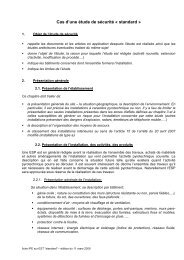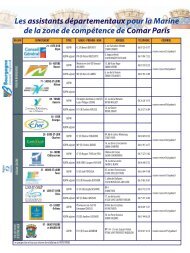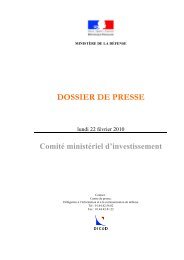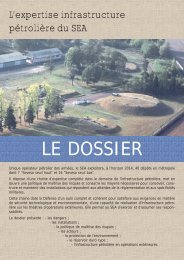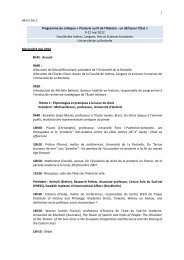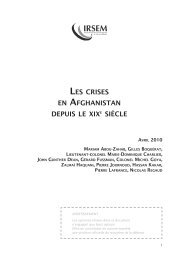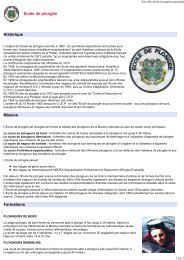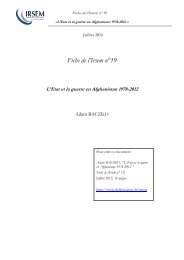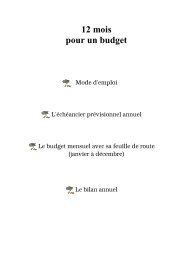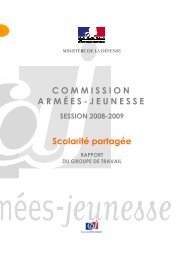Rapport Védrine_ENG_GERMAN - Ministère de la Défense
Rapport Védrine_ENG_GERMAN - Ministère de la Défense
Rapport Védrine_ENG_GERMAN - Ministère de la Défense
Erfolgreiche ePaper selbst erstellen
Machen Sie aus Ihren PDF Publikationen ein blätterbares Flipbook mit unserer einzigartigen Google optimierten e-Paper Software.
two reasons: the failed implementation of a dual chain of command system within NATO, which would<br />
theoretically have allowed the <strong>de</strong>puty to SACEUR to activate the European chain of command if the<br />
United States <strong>de</strong>ci<strong>de</strong>d not to take action, and the American refusal to grant France the NATO Southern<br />
Command in Naples, which is the base of the American Sixth Fleet.<br />
D. When he was elected Presi<strong>de</strong>nt of the French Republic in May 2007, Nico<strong>la</strong>s Sarkozy was <strong>de</strong>termined<br />
to make a break with the “<strong>de</strong> Gaulle-Mitterrand” legacy, and more especially, the Chirac legacy, with<br />
regard to foreign and <strong>de</strong>fence policy, even though Jacques Chirac did try to return France to NATO's<br />
integrated military command.<br />
The newly-elected Presi<strong>de</strong>nt argued that, since France is one of the leading contributors, she should<br />
have a real say in p<strong>la</strong>nning and carrying out operations, and, furthermore, by returning to the integrated<br />
military command, France would mitigate her Allies’ mistrust concerning its Europe of Defence<br />
initiatives. But this <strong>de</strong>cision is also explicitly in line with a <strong>de</strong>termination to achieve rapprochement with<br />
the administration of Presi<strong>de</strong>nt G. W. Bush, following Jacques Chirac’s justifiable opposition to the<br />
American war in Iraq in 2003 and to see France become a member of the “western family” once again.<br />
Nico<strong>la</strong>s Sarkozy reaffirmed his intentions when speaking to the United States Congress on 7 November<br />
2007: “the more successful we are in establishing a European <strong>de</strong>fense, the more France will be<br />
resolved to resume its full role in NATO. I would like France, a founding member of our Alliance and<br />
already one of its <strong>la</strong>rgest contributors, to assume its full role in the effort to renew NATO's instruments<br />
and means of action and, in this context, that it should allow its re<strong>la</strong>tions with the Alliance to evolve, just<br />
as European <strong>de</strong>fense should grow and evolve.”<br />
On 17 June 2008, he went further: “Today, the White Paper Commission (...) found that there is nothing<br />
to stop us from participating in NATO military structures, since, to my mind, there can be no progress on<br />
France's integration into NATO unless there is first progress on the Europe of Defence."<br />
E. On 19 March 2009, he sent a letter to the Heads of State and Government of the At<strong>la</strong>ntic Alliance to<br />
confirm his intentions. France’s return to the integrated military command was announced at the NATO<br />
Summit in Strasbourg/Kehl on 3 and 4 April 2009.<br />
Presi<strong>de</strong>nt Sarkozy let it be known that he did not ask for anything in return, since, in his view, the return<br />
was in France's best interest, did not un<strong>de</strong>rmine her sovereignty and was not a sacrifice requiring<br />
compensation. But he asked that France return to its “rightful p<strong>la</strong>ce” – one of the top p<strong>la</strong>ces – in NATO.<br />
The "new prospects" for the Europe of Defence that he was hoping for could be found more in military,<br />
industrial and technological capabilities, rather than in institutional capabilities. Presi<strong>de</strong>nt Sarkozy also<br />
thought that France obtained some guarantees un<strong>de</strong>r Article 20 of the 2009 NATO Summit Dec<strong>la</strong>ration:<br />
“NATO recognises the importance of a stronger and more capable European <strong>de</strong>fence, and welcomes<br />
the EU’s efforts to strengthen its capabilities and its capacity to address common security challenges<br />
that both NATO and the EU face today.”<br />
The French White Paper “on <strong>de</strong>fence and national security” released in June 2008 set three conditions<br />
for France’s full participation in NATO structures: full freedom to assess France's contribution to NATO<br />
operations; continued nuclear in<strong>de</strong>pen<strong>de</strong>nce (in 2009, France also rightly confirmed its <strong>de</strong>cision not to<br />
join the Nuclear P<strong>la</strong>nning Group (NPG) and this should not be changed); no French forces to be p<strong>la</strong>ced<br />
un<strong>de</strong>r the permanent command of NATO in peacetime.<br />
5



